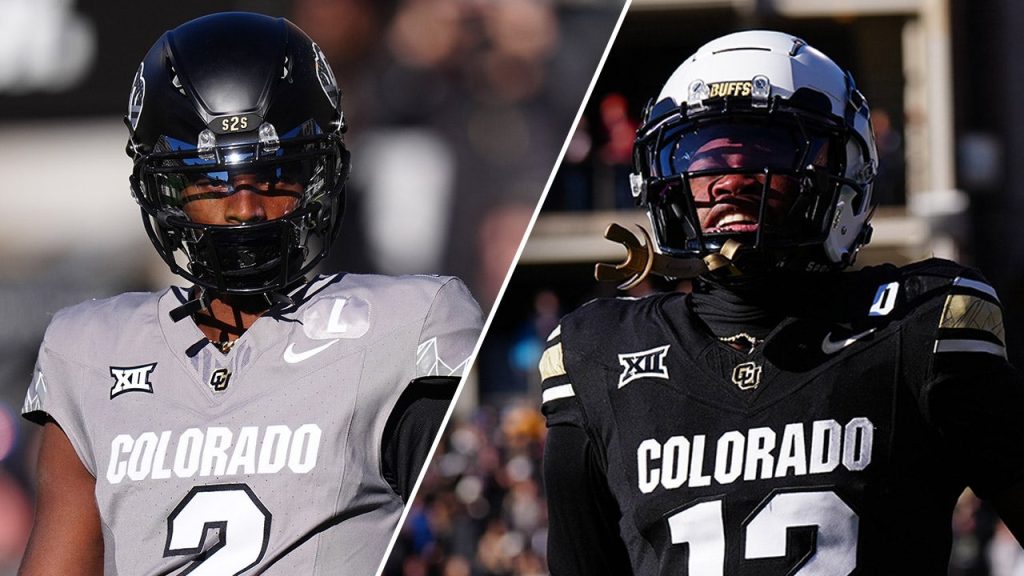Shedeur Sanders and Travis Hunter, two standout players from the University of Colorado, are defying a growing trend among NFL-bound college athletes by choosing to participate in their team’s bowl game, the Alamo Bowl against BYU. Recognizing the potential risks involved for these high-profile draft prospects, Colorado has taken the unprecedented step of securing historic disability insurance policies for both Sanders and Hunter, covering them in the event of serious injury during the game. This move, initiated by head coach Deion Sanders, underscores the university’s commitment to protecting their players’ futures, especially given their projected high draft positions and the substantial financial implications associated with them. The insurance coverage procured for Sanders and Hunter is reportedly the highest ever seen in college football, reflecting their exceptional talent and potential earnings at the professional level.
The decision to play in the bowl game demonstrates Sanders and Hunter’s dedication to their team and their desire to finish the season strong. While some NFL prospects opt to skip bowl games to avoid potential injuries that could jeopardize their draft stock, Sanders and Hunter have prioritized playing alongside their teammates one last time. This commitment speaks volumes about their character and loyalty, showcasing a team-first mentality that is often lauded by NFL scouts and coaches. Their decision also signifies their competitive drive and desire to contribute to the team’s success, even in the face of potential personal risk.
Coach Deion Sanders, father of Shedeur, has been instrumental in securing the insurance policies, emphasizing the importance of protecting the players’ futures. He has publicly acknowledged their potential high draft positions, referring to them as likely top two picks in the upcoming NFL draft. Sanders’ advocacy for his players reflects his understanding of the business side of football and the significant financial implications of potential injuries. By securing these unprecedented insurance policies, he has ensured that his players’ financial well-being is protected, allowing them to focus on their performance in the Alamo Bowl without undue worry.
Both Shedeur Sanders and Travis Hunter are projected to be top-five picks in the 2025 NFL Draft, with their exceptional performances this season garnering national attention and accolades. Hunter, a versatile two-way player, has achieved historic feats, winning both the Biletnikoff Award (nation’s top receiver) and the Bednarik Award (nation’s top defensive player), a feat never before accomplished in college football. His impressive statistics on both sides of the ball highlight his unparalleled athleticism and skill, making him a highly coveted prospect for NFL teams. Shedeur Sanders, the team’s quarterback, has also had a remarkable season, leading Colorado to a significantly improved record and earning the Johnny Unitas Golden Arm Award, recognizing his outstanding performance and character.
Shedeur Sanders’ impressive passing statistics and leadership on the field have solidified his position as a top quarterback prospect. He is expected to be one of the first two quarterbacks selected in the draft, alongside Miami quarterback Cam Ward. His ability to read defenses, make accurate throws, and lead his team to victory has garnered significant attention from NFL scouts, and his performance in the Alamo Bowl could further enhance his draft stock. The New York Giants, currently holding the No. 1 pick in the upcoming draft, are among the teams likely considering selecting either Sanders or Hunter.
The decision by Sanders and Hunter to play in the Alamo Bowl, coupled with Colorado’s proactive approach to securing historic insurance policies, sets a significant precedent in college football. It highlights the increasing importance of protecting players’ financial futures in the face of potential injury and underscores the evolving landscape of the college-to-NFL transition. Their participation in the bowl game showcases their dedication to their team and their competitive spirit, while the insurance policies provide a safety net that allows them to compete without the fear of jeopardizing their future professional careers. Their story is likely to influence future discussions on player safety and financial security in college football, potentially leading to more widespread adoption of similar insurance policies for high-profile draft prospects participating in bowl games.

